
LEWISBURG, Pa. (BP)–Democratic candidates in this presidential election cycle have demonstrated a greater comfort level in discussing their religious beliefs, but they will not convince many “values voters” to support them as long as the political parties differ so strikingly on the abortion issue, Southern Baptist church-state specialist Richard Land said at a recent panel discussion at Bucknell University.
In a forum on religion and politics in the United States, Land said Sens. Barack Obama and Hillary Clinton are much more comfortable talking about their faith than were Al Gore and John Kerry, the Democrats’ 2000 and 2004 nominees. For now, however, the divide remains on abortion — Democrats support abortion rights in their platform, while Republicans have a pro-life plank in theirs.
“[A]s long as there is a bright-line distinction between the two parties when it comes to the issue of when an unborn citizen’s life can be ended and under what circumstances it can be ended, there’s not going to be a lot of shifting in the so-called values voters,” said Land, president of the Ethics & Religious Liberty Commission.
“Values voters” include not only evangelical Christians but traditional mainline Protestants and traditional Roman Catholics as well, Land said.
The other panelists for the discussion at Bucknell, a private school in east-central Pennsylvania, were Barry Lynn, executive director of Americans United for Separation of Church and State; Luis Lugo, director of the Pew Forum on Religion and Public Life; and Obery Hendricks, professor at New York Theological Seminary
It “may or may not be a good thing” that Democrats seem to be “comfortable with Barack Obama and Hillary Clinton on the matters of religion,” Lynn said, following up with one of several comments by the panelists that produced outbursts of laughter from the audience of students and townspeople. “They seem to be religious people. After all, they’re usually in four churches every Sunday.”
One audience member asked if tension between GOP front-runner John McCain and evangelicals, possibly represented by Focus on the Family chairman James Dobson’s assertion he would not vote for the Arizona senator, would depress the conservative vote in November.
Neither Land, Lynn nor Hendricks seemed to think so.
“Look, I love Dr. Dobson,” Land said. “I have great respect for Dr. Dobson. But it’s been my observation that it’s very difficult to lead conservatives where conservatives don’t want to be led. It’s like trying to herd tomcats who haven’t been neutered. They’re going to decide for themselves.”
There “would have been a significant depression of conservative evangelical voting” if Rudy Giuliani, who supports abortion and homosexual rights, had been the GOP nominee, Land said. “But John McCain has been reliably pro-life his entire congressional career — though not a spotless record, certainly a very reliable record.
“And where he’s weakest among evangelicals is on his economic views,” Land said. “If you were going to prioritize among evangelicals, their social views are first; their foreign policy views are second; and their economic views are third. They vote against their pocketbook all the time and have demonstrated that they do so.”
Lynn said he believes religion should not be a factor when Americans consider whom to vote for, but he said “there are right ways to ask questions about values and morals.”
“I think the press these days tends to ask simplemindedly wrong questions about those topics,” Lynn said. “If you say — ‘What if any role would your religious beliefs play in formulating public policy? Please be specific.’– I think that’s a legitimate question. And I wish the answer would be: ‘Religious or theological matters are left for other institutions, not politics.'”
Though he disagrees with Lynn on many church-state topics, Land said he thought he agreed with him on the news media’s handling of religion in the campaign.
“I think it’s inappropriate to ask a candidate about the particular theological formulation of his or her faith and the particular doctrines of their faith, whether they’re Catholic or whether they’re Mormon or whether they’re Baptist,” Land said. “I think all the candidates have been abused by the way the press has asked its questions about the particulars of their faith.”
Doctrinal questions should be asked in some cases, Hendricks said at the Feb. 6 forum. He then gave an example related to Mitt Romney, a Mormon and Republican candidate who has since withdrawn from the race.
“I’ve read in the Book of Mormon some absolutely hateful, horrible quotes about African Americans … not just in one or two places,” said Hendricks, an African American who serves on the faith advisory council of the Democratic National Committee. “So there have to be theological questions asked. And that is, ‘You’re running for president, sir. We’ve never heard you abrogate, we’ve never heard you reject specifically [those statements].’
“Why is that important? Because if someone has a question about the humanity or the worth of those that they’re governing, they’re going to be less concerned about them when it comes to policy-making,” Hendricks said.
Lynn described the presidential primary season as “religion-drenched,” but Lugo said the Pew Forum’s polling shows that is what the American public wants.
About two-thirds of Americans think “we either had the right amount” or “not enough,” even after the “religiously drenched campaigns, as Barry called them,” Lugo told the audience. “Forty percent tell us it’s not enough. … [T]hey even have a high degree of tolerance for bringing religiously based moral arguments into their policy making.”
Candidates should talk about their faith to the extent they are comfortable doing so, Land said, and voters should “look at how their faith does or does not impact their character, their life, their record, their vision for the country’s future.”
Southern Baptists have done so, Land explained, with some interesting results since 1980.
“I would like to point out that four of the last five times that Southern Baptist have had the opportunity to do so, a majority of them have voted against the Southern Baptist and for someone of a different faith tradition in presidential races in the United States,” Land said.
Jimmy Carter, Bill Clinton and Gore were all Southern Baptists when they ran for president.
–30–
Tom Strode is Baptist Press’ Washington bureau chief.
















